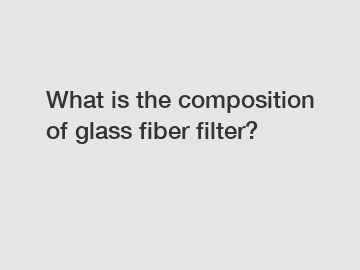What is the composition of glass fiber filter?
What is the composition of glass fiber filter?
Glass fiber filters are commonly used in various industries for their excellent filtration properties. But have you ever wondered what exactly glass fiber filters are made of? In this article, we will delve into the composition of glass fiber filters and explore their unique characteristics. So, let's get started!
1. Glass Fiber:

The primary component of a glass fiber filter is, as the name suggests, glass fibers. These fibers are made from a variety of materials, including silica, borosilicate, or fiberglass. These materials are melted at high temperatures and then spun into thin fibers using a process called fiberization. The resulting glass fibers are known for their high tensile strength and durability, making them ideal for filtration purposes.
2. Binders:
To enhance the structural integrity of the glass fiber filter, binders are used. These binders help hold the fibers together, creating a stable and robust filter medium. Common binders used in glass fiber filters include thermosetting resins like phenolic or acrylic resins. The binders also contribute to the overall filtration efficiency of the filter by ensuring a uniform pore distribution.
3. Pore Size:
The pore size of a glass fiber filter plays a crucial role in determining its filtration capabilities. Glass fiber filters can be manufactured with a wide range of pore sizes, from microns to submicron levels. The pore size directly affects the filter's ability to capture particles of different sizes. Smaller pore sizes are more effective at capturing fine particles, while larger pores can handle higher flow rates.
4. Surface Treatments:
To enhance filtration efficiency and make the glass fiber filter more suitable for specific applications, surface treatments are often applied. These treatments can modify the charge, hydrophilicity, or hydrophobicity of the filter surface. For example, in some cases, a thin layer of resin is deposited on the surface to create a positively or negatively charged filtration matrix, which helps attract and capture charged particles. Surface treatments also contribute to the filter's stability and strength.
5. Chemical Compatibility:
The composition of glass fiber filters makes them highly resistant to chemicals and solvents. They can withstand exposure to a wide range of substances without losing their filtering properties. This chemical compatibility makes glass fiber filters ideal for various applications, including air and water filtration, pharmaceutical manufacturing, and laboratory analysis.
6. Heat Resistance:
Glass fiber filters exhibit excellent heat resistance, allowing them to withstand high temperatures without any significant degradation. This property makes them suitable for filtration in applications that involve hot gases or liquids. Moreover, glass fiber filters can be effectively sterilized by autoclaving, which makes them highly desirable in sterile environments.
7. Versatility:
One of the standout features of glass fiber filters is their versatility. They can be used in both aqueous and non-aqueous filtration processes, making them widely applicable across various industries. From industrial processes to environmental monitoring, glass fiber filters are indispensable for their ability to capture particulate matter efficiently.
In conclusion, glass fiber filters are composed of glass fibers, binders, and sometimes surface treatments. Their unique composition provides them with remarkable filtration capabilities, heat resistance, and chemical compatibility. Glass fiber filters can be manufactured with different pore sizes and can undergo various surface treatments to enhance their filtration efficiency. The versatility of glass fiber filters makes them a vital component in numerous industries, ensuring reliable separation and purification of substances. So, next time you come across a glass fiber filter, you will have a deeper understanding of its composition and its role in filtration processes.
For more ceramic foam filter, Customized High Silica Glass Fiber Filter, ceramic foundry filterinformation, please contact us. We will provide professional answers.

Comments